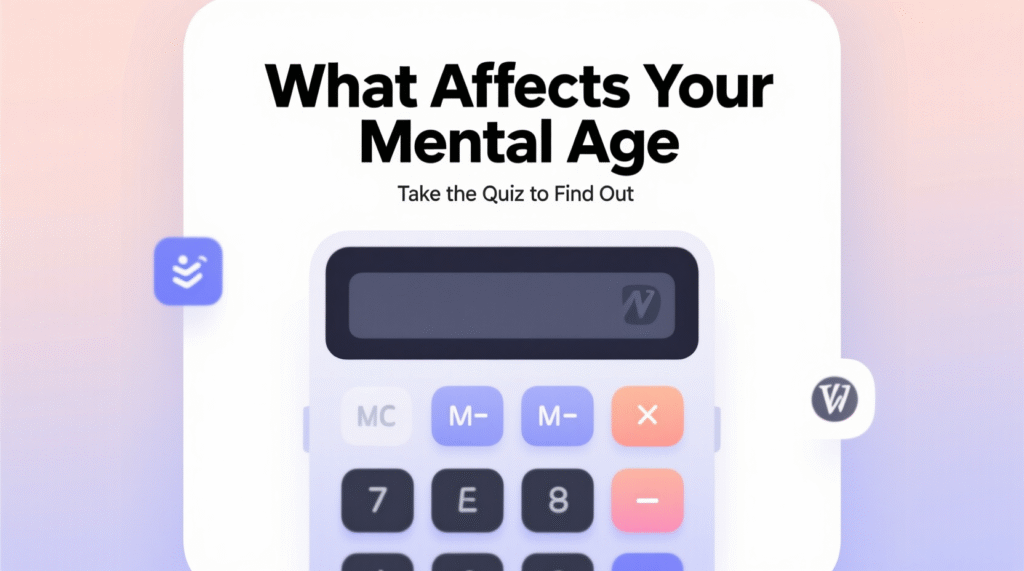
Your mental age isn’t the same as the number of candles on your birthday cake. It reflects how mature or youthful your mindset feels compared to your actual age. Some people in their 20s think and act like seasoned adults, while others in their 40s still carry the curiosity and playfulness of youth. But what exactly influences this gap?
Let’s look at the main factors that affect your mental age.
5 Key Factors That Shape How Old Your Mind Feels
Life Experiences
The challenges and responsibilities you face in life often shape how old your mind feels.
- Taking responsibility early—such as caring for siblings or managing finances—can make your mental age higher than your real age.
- Living in carefree environments may keep your mental age lower, preserving a youthful, spontaneous outlook.
Emotional Intelligence
Emotional intelligence (EQ)—your ability to understand, manage, and express emotions—plays a big role.
- High EQ: You’re more likely to pause before reacting, show empathy, and make thoughtful decisions—signs of a mature mental age.
- Low EQ: Quick reactions and mood-driven choices often signal a younger mental age.
Learn the scientific background on how our mental age test works and what impacts your results.
Stress and Coping Style
How you respond to stress can age your mindset.
- Adaptive coping—planning, problem-solving, reflecting—leads to resilience and often raises mental age.
- Impulsive coping—avoiding problems, reacting emotionally—tends to keep your mental age younger.
Education and Learning
The more you expose yourself to new ideas and challenges, the more mentally mature you become.
- Lifelong learners often feel younger mentally because curiosity keeps the brain active.
- At the same time, formal education and diverse experiences can accelerate maturity by broadening perspective.
Social Circles and Culture
The people you surround yourself with shape how old you feel mentally.
- Spending time with younger peers may keep your mental age playful and carefree.
- Being around older or more experienced groups can nudge your mental age higher.
- Cultural expectations also matter—some societies encourage independence early, while others promote extended youth.
Check how to improve mental age for practical ways to develop a more balanced mindset.
Quick Comparison: What Shapes Mental Age
| Factor | Influence on Mental Age |
|---|---|
| Life Experiences | Early responsibility raises maturity; carefree living lowers it |
| Emotional Intelligence | High EQ = mature mindset; low EQ = youthful reactions |
| Stress Coping Style | Resilient coping raises mental age; impulsive coping lowers it |
| Education & Learning | Exposure to ideas matures perspective; curiosity keeps mind young |
| Social Circles & Culture | Peers and norms either accelerate or delay mental maturity |
Discover how mentally developed you are by taking our mental age test.
Can Your Mental Age Change?
Yes. Unlike chronological age, your mental age is flexible. Major life events, career changes, personal growth, or new environments can shift how old your mind feels.
FAQs
Does a younger mental age mean immaturity?
Not necessarily. A younger mental age often reflects creativity, energy, and flexibility.
Is a higher mental age better?
Not always. It brings wisdom and foresight, but may reduce spontaneity and playfulness.
What’s the healthiest mental age?
A balance—keeping curiosity alive while applying maturity when it matters most.
If you want to understand your thought patterns, try our psychological maturity test.
- Your daily habits often dictate the link between mental age and decision making in stressful situations.
- Environmental stressors can explain how personality is affected as you grow older.
- It helps to differentiate these factors from cognitive age benchmarks to get a clear picture.
- Understanding the root causes explains why mental age is important for personal development.
- Once you know the factors, you can learn how to interpret test results more effectively.
- A common influence is the disparity between mental age vs chronological age in your social circles.
- Managing these factors often involves finding ways to improve emotional intelligence.